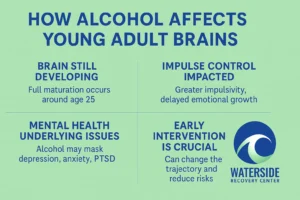You didn’t expect to be in this position.
Your child is technically an adult. Maybe they’re 18, maybe 22. They can vote, sign forms, even rent an apartment. But lately, their choices—and especially their drinking—have left you staring at the ceiling at 2 a.m., wondering what comes next.
You’ve tried conversations. Boundaries. Maybe even consequences. But the drinking hasn’t stopped. Maybe it’s gotten worse. Maybe it’s starting to scare you.
If you’re seeing behavior that feels out of control—or a young adult using alcohol in ways that are clearly harming their life—please know this: You are not alone. And you are not powerless.
Understanding how alcohol affects the developing brain can help you make informed decisions—and act early, before temporary patterns become permanent ones.
Our alcohol addiction treatment program in Plymouth County, MA is built for young adults—and the families who love them through the hardest chapters.
Let’s walk through the science, the stakes, and the steps you can take.
The Developing Brain Is Still Under Construction Until the Mid-20s
It’s a common myth that the brain finishes developing at 18. In truth, the human brain—particularly the prefrontal cortex—doesn’t fully mature until around age 25.
This part of the brain controls:
- Decision-making
- Risk assessment
- Emotional regulation
- Long-term planning
- Impulse control
For young adults, this means that the systems responsible for “stop and think” or “this might not end well” are still wiring themselves together.
When alcohol enters that system during this critical development period, it doesn’t just cause temporary intoxication—it interferes with how the brain matures.
That’s why early and heavy alcohol use can cause:
- Increased impulsivity
- Delayed emotional growth
- Difficulty forming long-term habits
- Greater risk for depression, anxiety, and addiction later in life
It’s not just a phase. It’s a neurobiological disruption.
Emotional Growth Can Stall When Alcohol Becomes the Coping Tool
Adolescents and young adults use alcohol for all kinds of reasons:
To be social. To feel confident. To numb sadness. To slow racing thoughts. To sleep.
But here’s the catch: every time they use alcohol to avoid an uncomfortable emotion, they miss a chance to learn how to move through that emotion without numbing it.
Over time, this can stunt emotional development.
You might notice:
- They can’t handle conflict without shutting down or blowing up
- They avoid hard conversations
- They break down over relatively small stressors
- They lean on alcohol anytime something feels overwhelming
It’s not just immaturity. It’s a brain that hasn’t learned how to feel and recover—because alcohol has been doing that job temporarily.
Early intervention helps young adults build emotional tools before they hardwire alcohol as the go-to response.

Mental Health Issues Often Hide Behind the Drinking
One of the most heartbreaking realities in young adult substance use is this: many are drinking to manage a mental health issue they don’t have words for yet.
That could be:
- Social anxiety
- Depression
- PTSD or unresolved trauma
- Undiagnosed ADHD
- Generalized anxiety or panic attacks
Alcohol provides a fast (and initially effective) numbing effect. But as tolerance builds, they need more to get the same relief. And when they’re not drinking, the underlying issue gets louder.
Many parents describe this as a “Jekyll and Hyde” pattern:
- They’re calm when drinking, volatile when not
- They’re functional for days, then crash hard
- They deny there’s a problem—until they’re in crisis
Getting to the root takes more than willpower. It takes clinical care designed for young adults.
The Risk of Long-Term Consequences Is Real—But So Is Recovery
Let’s pause for a moment on something heavy.
Research shows that young people who begin drinking heavily before age 21 are significantly more likely to experience:
- Substance use disorders later in life
- Academic failure
- Job instability
- Memory and concentration issues
- Co-occurring mental health disorders
But here’s the part we want you to hold onto:
Early treatment can change this trajectory.
The brain is still flexible in early adulthood. With the right support, damaged patterns can be interrupted. Emotional growth can resume. New coping skills can be built. Long-term risks can be drastically reduced.
The earlier you intervene, the more hope there is for full recovery—not just from drinking, but from the pain that started it.
What Early Treatment Actually Looks Like
You may think treatment means sending your child away, uprooting their life, or forcing them into something they’ll resist.
That’s not always the case.
At Waterside Recovery, our alcohol addiction treatment program in Plymouth County, MA meets young adults where they are:
- Outpatient or day treatment options that allow them to live at home
- Group therapy with peers their own age
- Individual therapy focused on building emotional skills
- Psychiatric evaluation and medication support if needed
- Family involvement to help rebuild trust and boundaries
If you’re looking for alcohol addiction treatment in Bristol County, MA or nearby, we can help you explore the right level of care.
We don’t treat your child like a “problem.” We treat them like a person in pain who hasn’t yet found a better way to cope.
You Can Act Before They’re “Ready”
One of the most common things we hear from parents is, “They’re not ready.”
And you’re right—they might not be.
But here’s the truth: most young adults who enter treatment aren’t 100% ready. Readiness often comes after they feel seen, safe, and supported in a therapeutic environment.
You don’t need to wait for a total rock bottom to act. You just need to open a door.
That might look like:
- Scheduling a consultation with a program
- Attending a family session yourself
- Talking to your child about what you’ve noticed—calmly, without blame
- Offering treatment as a step forward, not a punishment
You’re not forcing them. You’re providing structure in a moment of chaos.
FAQs: Alcohol Use and Young Adults
Is it normal for college students to drink?
Yes—social drinking is common. But regular binge drinking, blackouts, or using alcohol to cope emotionally or mentally are not normal. These are warning signs.
When does drinking become a problem?
It becomes a concern when it impacts your child’s health, school, relationships, decision-making, or emotional stability. You don’t have to wait for a crisis to intervene.
What if my child denies they have a problem?
That’s typical. Denial is part of addiction—but often also part of fear. Many young adults are scared that treatment means losing freedom. We work with families to bridge that gap and engage gently.
Will this affect their future?
Untreated alcohol addiction certainly can. But getting treatment now can protect their academic, emotional, and career future. Early treatment increases long-term success.
What if they refuse to go?
You can still meet with us. Many parents start by learning their options, getting support, and preparing to act when the next crisis comes. We’ll guide you at your pace.
The earlier you reach out, the more we can protect.
Call (866)671-8620 or visit Alcohol Addiction Treatment in Plymouth County, MA to learn more. You’re not alone—and you don’t have to figure this out by yourself.


